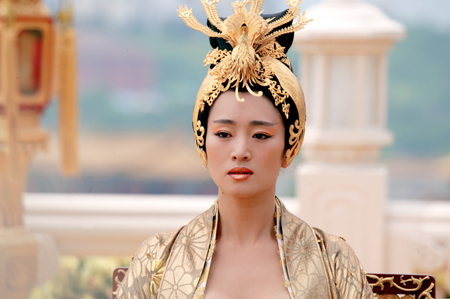

Reviews of Recent Independent, Foreign, & Documentary Films in Theaters and DVD/Home Video
Directed by: Zhang Yimou. Produced by: Bill Kong & Zhang Weiping. Written by: Yimou, Wu Nan, & Bian Zhihong, based on the play Thunderstorm by Cao Yu. Director of Photography: Zhao Xiaoding. Edited by: Cheng Long. Music by: Shigeru Umebayashi. Released by: Sony Pictures Classics. Language: Mandarin with English subtitles. Country of Origin: China/Hong Kong. 114 min. Rated: R. With: Chow Yun Fat, Gong Li, Jay Chou, Liu Ye, Chen Jin, Ni Dahong, Li Man & Qin Junjie. Curse of the Golden Flower is almost too beautiful for its own good. If it seems like director Zhang Yimou spends too much time focusing on the wardrobe of 10th Century China and not enough on character development, that’s because he does. And if you get the sense that there is some small justification in repeatedly showing the factory-like workings of an ancient palace when there is a more intimate, compelling story to be told, that’s also because there is. Throughout, he uses set design and cinematography to exaggerate the narrative. Gong Li (Raise the Red Lantern, Memoirs of a Geisha) is the ailing Empress who is secretly planning to attack her husband, the Emperor (Chow Yun Fat), believing he has been poisoning her. The two spend most of the film apart, as the tension mounts for when they finally stand side-by-side at the impending and climactic chrysanthemum festival. Using their three sons as leverage, the marital warfare combines the dynamics of The Lion in Winter (1968) with the outlandishness of Mr. & Mrs. Smith (2005). Hypnotically icy no matter what the dialogue calls for, Gong Li commands attention as a woman who doesn’t want power so much as she wants to take it from her husband. The performance is a welcome departure from this summer’s Miami Vice, where Li’s range was restricted by the dubious quality of her English. Chow Yun Fat, sporting a beard just long enough to stroke whenever he wants to seem menacing, is frighteningly arrogant as the leader who always seems to be one step ahead of any looming threat, willing to do whatever it takes to maintain his throne.
There isn’t as strong of an emotional attachment to the characters here as there is in Yimou’s House of Flying Daggers (2004), and
the editing isn’t as inventive as that of Hero (2003), but Yimou still manages to construct an undeniably watchable melodrama. The first act
drags, taking far too long to establish the relationships, but once the battle lines have been drawn, there is rarely a wasted moment. And for once, we get to witness an ancient Chinese battle where characters don’t have the ability to jump great distances with ease, as the use of ropes is actually incorporated into the fight sequences. Michael Belkewitch
|